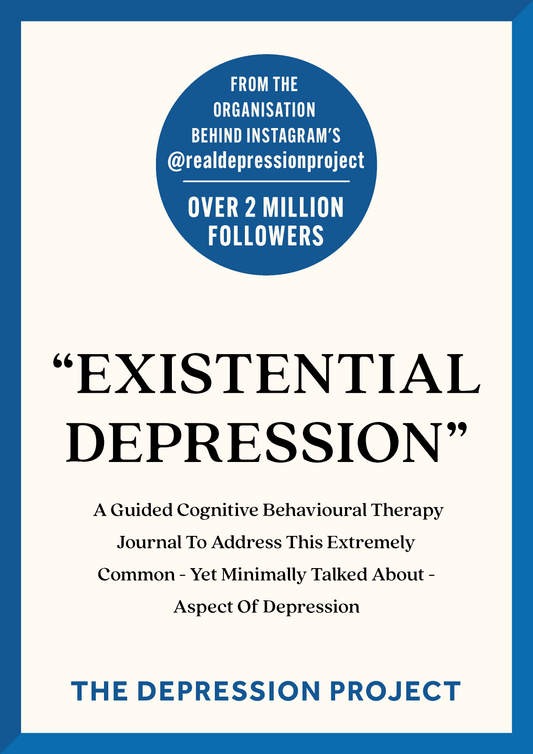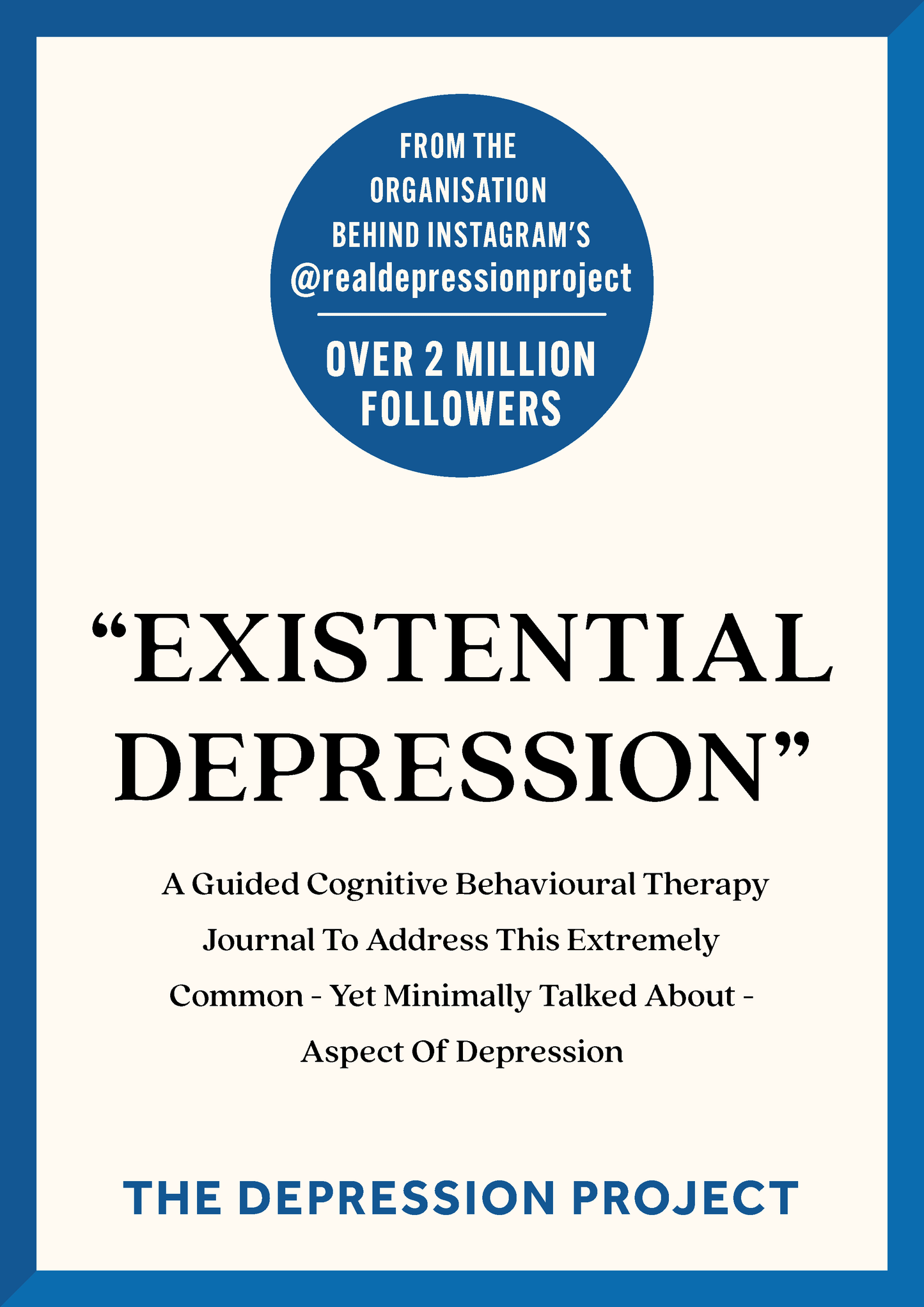
Do existential issues trigger your depression?
In late 2021, The Depression Project posed a question to our 2,000,000+ Instagram followers in one of our “stories”:
Do you have your depression triggered by existential things?
Over 27,000 people responded, and would you like to know how many of them answered yes?
90%.

And, this isn’t particularly surprising, since, according to our community, “existential depression” can involve intrusive, troubling and unsettling thoughts – such as:
- “What is the purpose of life?”
- “After what I've lost, there’s no point being alive anymore.”
- “I can’t stop thinking about death – about what comes after it and what it’s going to feel like.”
- “Am I living the ‘right’ way?”
- “Why is there so much suffering in the world?”
- “Do I really want to keep living in this cruel, unfair world?”
- “What’s the point in anything if we’re all going to die?”
- “What if what I’m longing for never ends up happening? What will the point in anything be then?”
- “Why am I being put through so much pain?”
- “Surely there's more to life that this?”
And, as a result of grappling with these kind of intrusive, troubling and unsettling thoughts, it’s common for people with “existential depression” to feel, among other emotions:
- Overwhelmed;
- Unmotivated;
- Miserable and full of despair;
- Hopeless.
Consequently, we at The Depression Project have put together this journal, in order to help you cope with and in time overcome “existential depression”, so that you can:
- Feel much more in control of your intrusive existential thoughts;
- Feel less overwhelmed, unmotivated, miserable and hopeless;
- Find more meaning, purpose and fulfilment in life.
Here’s A Breakdown Of Exactly What This Journal Will Cover
PART 1: How Living Your Life In Alignment With Your Values Can Help You Overcome “Existential Depression”
A vital component of overcoming “existential depression” is living in alignment with your values – which can be thought of as your heart’s deepest desires for what you want your life to be about, and for the kind of person that you want to be. In particular, this is because:
- Like we’ve said, lack of meaning, purpose and fulfillment are primary causes of “existential depression”. And, if you can relate, then living your life in alignment with your own personal values which you have deemed as deeply important and meaningful to you ensures that – by definition – your life will be meaningful, purposeful and fulfilling for you. Similarly, values-based living is also an antidote to the common existential thought “what’s the point in anything if we’re all going to die?” After all, even though life is finite, if it’s lived in alignment with your values, then it will still contain meaning, purpose and fulfilment for you.
- For the same underlying reasons, values-based living can also definitively answer – and therefore end speculation to – the existential thought “do I really want to keep living in this cruel, unfair world?” This is because when you’re living in alignment with your values and your life therefore contains meaning, purpose and fulfilment, the answer to this question will almost certainly be “yes” (for example, if this is an existential thought you think, then you likely value “justice” and “helping others”. And, if this is the case, then acting in alignment with these values – such as by protesting against injustices and/or volunteering to help victims of the world’s unfairness – will likely give your life the meaning, fulfillment and purpose you need in order to want to continue living it).
- Additionally, uncertainty over whether or not you’re “living the right way” is another source of “existential depression” that values-based living can help to resolve. This is because, while there is no universal “right way” to live, the values you choose to live by will give you direction and guide your life’s journey – and in this way, they illuminate the way to live that is right for you.
- Furthermore, if you’ve experienced some form of loss – such as through the death of a loved one, an important relationship ending, or the end of a dream that you poured your heart and soul into, for example – then you may find yourself experiencing existential thoughts such as “after what I’ve lost, there’s no point being alive anymore”. However, even in these devastating cases, living a life in alignment with your values – even if those values change as a result of the loss you’ve endured – can still give you meaning, purpose and fulfilment moving forwards (for example, if you lose a loved one, then if you value helping other people, this could manifest in you supporting other people who have suffered a similar loss to you. Similarly, if you value honouring your loved one’s memory and “living a life that they would be proud of”, then it may manifest in you going all out to chase your dreams that in the past, you may have been too scared to pursue).
- Moreover, like we’ve mentioned, “existential depression” can also be fuelled by the thought “what if what I’m longing for never ends up happening? What will the point in anything be then?” However, like we’ll explain, values are not a goal that you long for which is either achieved or not achieved / realised or not realised. Rather, values can be found in the overarching purpose of your goal / what it is you are longing for. And, for this reason, even if what you are longing for does not end up happening, then as disappointing as this will undoubtedly be, it does not mean that your life will consequently be completely purposeless. After all, even in the face of this disappointment, you will still have the choice to, moving forwards, continue to act in alignment with your values. And, as long as you do this, your life will continue to have meaning, purpose and fulfilment.
As we hope you are starting to see, living in alignment with your values can be a vital component of overcoming “existential depression”. Consequently, in the first part of this journal, we’ll break down the steps you can take to live a values-based life, as well as share with you a variety of journal prompts to help you identify your own personal values and how you can start living your life in alignment with them.
PART 2: How Practicing “Radical Acceptance” Can Help You Overcome “Existential Depression”
Radical acceptance involves accepting that something just is what it is, and, rather than dwelling on it, questioning why it is the way it is and/or wishing that it wasn’t so, instead focusing your attention on how you can healthily deal with the situation, and move forwards as effectively as possible.
In particular, this strategy can be highly effective at helping you cope with the existential thoughts “what comes after death and what will it feel like?”, “why is there so much suffering in the world?” and “why am I being put through so much pain?” Consequently, in the second part of this journal, we will:
- Show you how you can practice radical acceptance to cope with these thoughts;
- Share some journal prompts with you to help you think about how you can effectively implement this strategy moving forwards.
PART 3: How Disengaging From Unproductive Existential Thoughts Can Help You Overcome “Existential Depression”
If you’re struggling with “existential depression”, then you can likely relate to fixating on one or more existential questions that, no matter how much time you spend contemplating it, never gets you any closer to finding an answer. This kind of existential ruminating serves no useful purpose – and in fact causes harm by fuelling your “existential depression” – which is why in Part 3 of this journal, we will share with you:
- A variety of strategies to help you let go of these unproductive existential thoughts;
- Journal prompts to help you think about how you can effectively implement these strategies.
FAQ #1: Why should I be confident this journal will help me?
This journal is grounded in cognitive behavioural therapy - which in case you don't know, is a leading form of treatment for depression, anxiety, panic attacks, phobias, personality disorders, and a wide range of other mental health issues.
Additionally, this journal is also written with the warmth, care, encouragement and insight that, with 3,000,000+ followers on social media, The Depression Project has become renowned for :)
FAQ #2: What format does this journal come in?
This journal is available in two different formats for you to choose from:
- PDF - which you will be able to download instantly after purchase, and then print out at your home, office or local printer.
-
Paperback (if you live in the US or Canada) - which will be delivered to you within 4-8 business days. Shipping costs are US$7.95 within the US and CAD$14 within Canada. This shipping cost is a flat rate, so whether you order one journal, or multiple journals, the shipping cost will be the same (if you would like to, you'll find the option to add one or more other journals to your cart below so that you can save on shipping). Once your order has been shipped, you will be emailed a number so that you can track it.
FAQ #3: What if I give this journal a try but I don't like it?
We're extremely, extremely confident that you're going to find this journal immensely helpful. But, just in case you don't, the PDF version of this journal comes with a 60 Day, No-Questions-Asked, 100% Moneyback Guarantee!

If you have any questions about this journal, then please feel free to click here and contact us so that someone from our friendly team can answer them for you :)
Otherwise, we hope you choose to get this journal, because we know that you're going to find it really, really helpful!
All our love,
The Depression Project Team.
Format Options

